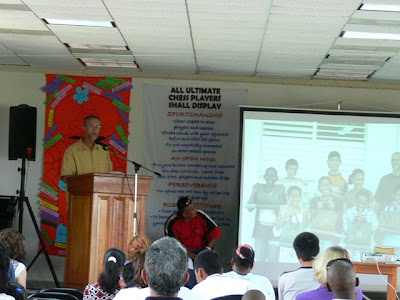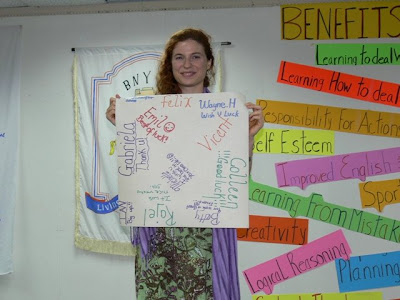To read on the 2008 event, please see below
July 19th, 2008 Saturday, 9:30am - 3:00pm
George Price Center, Belmopan
This symposium was designed to introduce the many of the attributes of the “Chess In Belize” primary school chess program and the benefits the program will provide to your school and your students.
Special Guest Speaker: Jennifer Shahade

Jennifer Shahade is a Women’s Grand-master, coach, writer and two-time American Women’s Chess Champion (2002, 2004). In 2005, she published her first book, Women in the Ultimate Intellectual Sport. She is the editor of uschess.org, the United States Chess Federation’s official website. In her coaching career, Jennifer Shahade has made a point of focusing her efforts on girls and inner-city youth. From 1998-2005, she worked with Chess-In-The-Schools, a New York City non-profit organization that provides chess instruction to inner city youth. From 2003-4, she taught a Girls’ Academy through Chess-in-the-Schools, and started her own Girls’ Academy in New York in 2007, the 9 Queens (www.9queens. org). She has given inspirational talks and lessons all over the world, including an all girls’ school in Soweto, South Africa in 2007. This year Jennifer was a co-host, with Jean Hoffman and Ella Anderson, the all primary girls chess camp at the Sibun “Chess Kingdom”Jungle Lodge, July 11 - 15.
Jean Hoffman is the co-founder and executive director of the 9 Queens non-for-profit organization.  Jennifer and Jean: co-founders of 9 Queens.
Jennifer and Jean: co-founders of 9 Queens.
She holds a bachelor’s degree from Yale University and a master’s degree in teacher education from Harvard University. As a former middle school teacher, tournament director and educational consultant, Jean has worked with students, teachers and administrators to promote and support chess education. Jean has taught and trained over 1,500 students, chess players, and public school teachers throughout the country to play chess and create effective and sustainable chess clubs and tournaments. Jean worked in New York City for Chess-in-the-Schools for three years as a chess instructor, development associate, and teams and tournaments manager. She organized a weekly, scholastic chess tournament series with over 500 participants, and served as the chief tournament director at these events. In addition to her work with 9 Queens, Jean also serves as the Director of Community Engagement for Voices for Education, a Tucson-based educational non-profit organization.
Ella Anderson holds 3 Masters Degrees culminating in Education and Administration, holding the position of In-School Program Director for N.Y. based Chess In the Schools program before founding the Belize National Youth Chess Foundation and the “Chess In Belize” primary school program which now extends to over 400 students in over 40 primary schools through out Belize. As both an educator and administrator, Ella knows the benefits of teaching chess from both disciplines. Ella represented the US chess program at the Chess Congress of the 36th Chess Olympiad in Calvia, Majorca, Spain, as guest speaker in 2004 and was the host and moderator at the First Annual “Belize Educators Symposium”.
More on Chess around the World:
.. the effects of chess are recognized throughout the world. The impact of chess in acquiring all the above mentioned benefits has been widely recognized. As the result chess became part of the curricula in nearly thirty countries.
In Vancouver, BC, Canada, the Math and Chess Learning Center, recognizing the correlation between chess playing and math skills development, has developed a series of workbooks to assist Canadian students in math. The mathematics curriculum in New Brunswick, Canada is a text series called Challenging Mathematics, which uses chess to teach logic and problem solving from grades two to seven. Using this curriculum, the average problem-solving score of pupils in the province increased from sixty-two percent to eighty-one percent. The Province of Quebec, where the program was first introduced, has the highest math grades in Canada, and Canada scores better than the USA on international mathematics exams.
The State of New Jersey passed a bill legitimizing chess as a unit of instruction within the elementary school curriculum. On December 17, 1992, New Jersey Governor Jim Florio signed into law a bill to establish chess instruction in public schools. A quote from the bill states “In countries where chess is offered widely in schools, students exhibit excellence in the ability to recognize complex patterns and consequently excel in math and science...”
 There are simply hundreds of in depth studies that provide expertise and hard data research that proves, beyond any doubt and supported by educators
There are simply hundreds of in depth studies that provide expertise and hard data research that proves, beyond any doubt and supported by educators and scientists, that teaching Chess as a motivational and educational tool, increases I.Q. and increases development of learning and life skills.
Chess-In-the-Schools, a New York based non-profit organization, teaches chess in elementary and junior high schools in 

 economically disadvantaged communities. Their sixteen-week curriculum is taught over the course of a semester as part of the regular school day with the classroom teacher present and participating in the lesson. Individual classes receive instruction once per week; lessons last a full class period and generally consist of a lecture, a structured activity and time for free play. Every year approximately 30,000 students are taught chess. In 1991 and 1996 two studies were conducted in the schools that were part of the program examining the effects of chess on children’s reading scores. The studies showed that students who participate in the chess program showed greater gains in reading scores. The gains were even greater among children with low or average initial scores. Children who were in the non-chess playing control group showed no gains.
economically disadvantaged communities. Their sixteen-week curriculum is taught over the course of a semester as part of the regular school day with the classroom teacher present and participating in the lesson. Individual classes receive instruction once per week; lessons last a full class period and generally consist of a lecture, a structured activity and time for free play. Every year approximately 30,000 students are taught chess. In 1991 and 1996 two studies were conducted in the schools that were part of the program examining the effects of chess on children’s reading scores. The studies showed that students who participate in the chess program showed greater gains in reading scores. The gains were even greater among children with low or average initial scores. Children who were in the non-chess playing control group showed no gains.
In 1999, Dr. Margulies, New York City based educational psychologist, conducted a groundbreaking study to measure the impact of chess on emotional intelligence. The result of the study was striking. The overall success rate in handling real life situations with emotional intelligence was 91.4% for the children who participated in the Chess-in-the-Schools program. In contrast, those who were not involved with the chess program had an average overall success rate of only 64.4%.
Pictures from the event:
before the event- banners made by the local volunteers: Presentations:
Presentations:





 Award Ceremony: Jennifer received the chess board signed by all the children who she was playing that day at simul:
Award Ceremony: Jennifer received the chess board signed by all the children who she was playing that day at simul:
 Awards of the Coaches of the Year presented by Jennifer Shahade:
Awards of the Coaches of the Year presented by Jennifer Shahade:



 Jennifer made a life long impression on our kids, who had a rare opportunity to play against her in the simultaneous game: she was friendly, down to earth, encouraging and ..everything what you wish to see from a real role model for kids.
Jennifer made a life long impression on our kids, who had a rare opportunity to play against her in the simultaneous game: she was friendly, down to earth, encouraging and ..everything what you wish to see from a real role model for kids.




Picture of all the coacehs, parents and players from the simul game:




We hope to see Jennifer Shahade coming back to Belize again!
 Jennifer and Jean: co-founders of 9 Queens.
Jennifer and Jean: co-founders of 9 Queens.  There are simply hundreds of in depth studies that provide expertise and hard data research that proves, beyond any doubt and supported by educators
There are simply hundreds of in depth studies that provide expertise and hard data research that proves, beyond any doubt and supported by educators 

 economically disadvantaged communities. Their sixteen-week curriculum is taught over the course of a semester as part of the regular school day with the classroom teacher present and participating in the lesson. Individual classes receive instruction once per week; lessons last a full class period and generally consist of a lecture, a structured activity and time for free play. Every year approximately 30,000 students are taught chess. In 1991 and 1996 two studies were conducted in the schools that were part of the program examining the effects of chess on children’s reading scores. The studies showed that students who participate in the chess program showed greater gains in reading scores. The gains were even greater among children with low or average initial scores. Children who were in the non-chess playing control group showed no gains.
economically disadvantaged communities. Their sixteen-week curriculum is taught over the course of a semester as part of the regular school day with the classroom teacher present and participating in the lesson. Individual classes receive instruction once per week; lessons last a full class period and generally consist of a lecture, a structured activity and time for free play. Every year approximately 30,000 students are taught chess. In 1991 and 1996 two studies were conducted in the schools that were part of the program examining the effects of chess on children’s reading scores. The studies showed that students who participate in the chess program showed greater gains in reading scores. The gains were even greater among children with low or average initial scores. Children who were in the non-chess playing control group showed no gains. 





















No comments:
Post a Comment